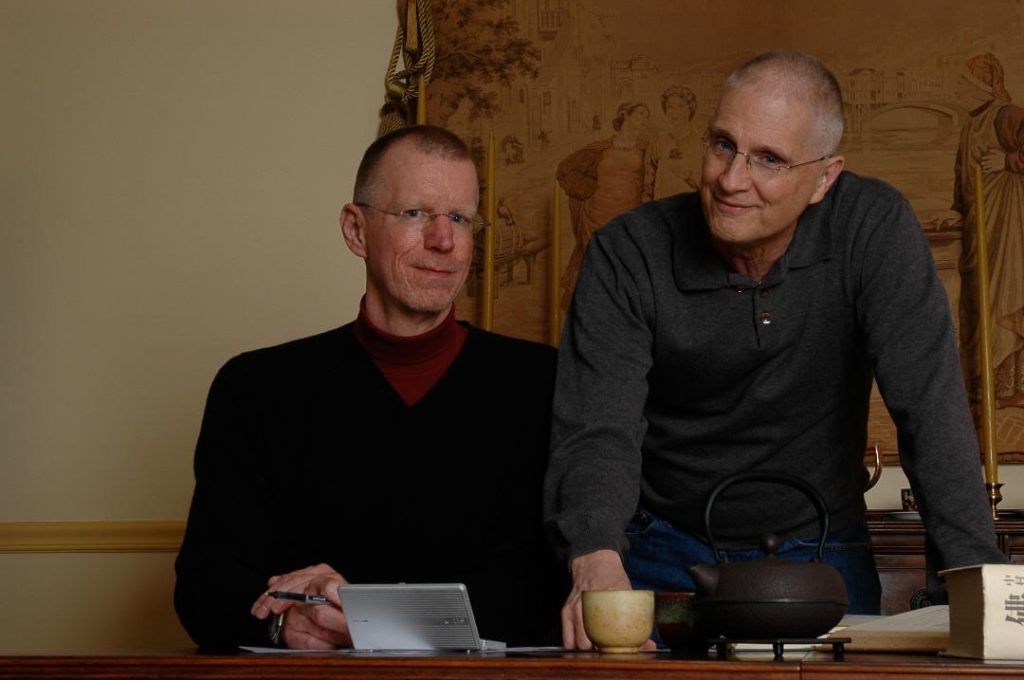when my dear lord may I come
where rumor says you are?
the pines of Iki—
though it’s you
who exhausts your heart with waiting
THESE WORDS SIGNIFY that the power of Amida’s will is such that anyone who hears the Name and longs to be reborn arrives in that land almost before realizing it, and achieves unshakeable faith.
How impatiently Amida must wait, sleeves of salvation damp, restless with longing! Anyone who understands Narihira’s poem “I should never have left home” must vow to return there in haste. Because I’ve heard that Ikinomatsu is a long sea-road to the west, may I liken it to that land?
inside this dream
grieving my bewildered heart—
how many nights
how many dawns
our eyes went without meeting
THE BODHISATTVAS WHO COULD SEE the white whorl of light emanating from between the Buddha’s eyebrows didn’t have hearts indifferent to seeking the Buddha-path, and this scripture says that they never slept.
But for one on the “path of love,” lost in fleeting dreams, the fact that sleepless nights pile up is really of no benefit.
where shall I rest my heart? adrift on waves of thoughts (in, out) then sunk, wondering— is there something? is there nothing? THE PREFACE SPEAKS OF A PERSON practicing śamatha-vipasyana meditation, considering only the true nature of the phenomenal world, and not mixing in thoughts about other things. Doesn’t meditating upon “am I or am I not?” still the mind in the truth of the middle way?
longed-for face
from which I’ve been parted
come, appear even in dreams —
lip-of-the-mountain
moon
HE WHO DIED LONG AGO, becoming “original dew,” when I think of our unendurable parting—the leaves of his words lodged in my heart, causing me to drop dew again and again upon my sleeves—doesn’t the clear form of this friend arise before me, in actual truth, when I’m unable to sleep?
And rises before me all the more whenever I think about when Sakyamuni was alive, a time when no one ever had enough of gazing on his form with its thirty-two aspects, nor ever tired of hearing directly the Law of unimpeded wisdom and the eight virtuous sounds.
But with the cremation wood exhausted, karmic opportunity faded up and away like smoke from the śala trees, where is the person who wouldn’t have plunged into thoughts of longing and reverence?
Having now entered into the latter days of the Law, for us to be sprinkled with blessing on this wondrous path is far beyond our reach, even if we hang our hearts on this figure of compassion, even if we’re unable to sleep for grieving.
In this dream of life and death, why can’t we see the face of the full moon?
Therefore it is written, “With single-hearted longing to see the Buddha,/they give their lives./Then with the companions of truth/I appear on Vulture Peak”—a saying not pertaining only to some heaven beyond the clouds.
If ever a time comes that the Buddha responds to the appeal of sentient beings, he will appear in our hearts on the mountain of the middle way.
STEPHEN D. MILLER, associate professor of Japanese language and literature at the University of Massachusetts Amherst, is the author of The Wind from Vulture Peak: The Buddhification of Japanese Waka in the Heian Period (Cornell East Asia Series, 2013). Miller is the editor of Queer Subjects in Modern Japanese Literature: Male Love, Erotics, and Intimacy, 1886-2014, forthcoming from University of Michigan Press. Miller’s co-translations with Patrick Donnelly in Vulture Peak won the 2015-2016 Japan-U.S. Friendship Commission Prize for the Translation of Japanese Literature.
PATRICK DONNELLY is the author of four books of poetry, most recently Little-Known Operas (Four Way Books, 2019). His poems have appeared in American Poetry Review, Slate, Ploughshares, The Yale Review, The Virginia Quarterly Review, Hayden’s Ferry Review, The Massachusetts Review, and many other journals. Recipient of a 2013 U.S./Japan Creative Artists Program award, Donnelly’s co-translation with Stephen D. Miller of the Nō play Shunzei Tadanori appeared in Like Clouds or Mists: Studies and Translations of Nō Plays of the Genpei War (Cornell East Asia Series, 2014).

The author of these poems, Jakuzen, a 12th century priest of the Buddhist Tendai sect, lived outside the capital of Kyoto in Ōhara. His two brothers, Jakuchō and Jakunen, were also poet-priests. Together, the three were known as the Ōhara sanjaku (the three “jaku” of Ōhara). Jakuzen left behind three manuscripts of waka poetry; that forty-seven of his poems were published in several imperial poetry anthologies of the 12th century and later is a mark of how highly they were regarded by his contemporaries.
These two poems are from the ”Love” section of Jakuzen’s most famous collection, Hōmon hyakushu (One Hundred Poems of the Dharma Gate). Each poem is preceded by a dai (short preface in Chinese from Buddhist scripture) and followed by a brief prose afterword.
The Japanese originals of these poems are waka, the thirty-one syllable form that was primary in Japanese poetics for more than a thousand years. As a translation team, we decided not to reproduce these syllabic poems as syllabic poems in English. The two languages are very different, and that difference determined their poetics. In Japanese every syllable receives the same amount of stress, but English is characterized by the alternation of strong and weak stresses. It has been our limited goal—difficult enough— to reproduce the poems’ radical smallness in our translations, and to convey their emotional and spiritual arguments in idiomatic, musical, contemporary English.
“Our idea in calling this the ‘Translator’s Page’ is to show the ways and/or languages in which a translator works. Monthly posts may include translations from different languages and styles and centuries. The connective thread between them is the ability of the translator to interpret cultures and time periods for the contemporary reader.”
—Jonathan Wells, curator of The Translator’s Page